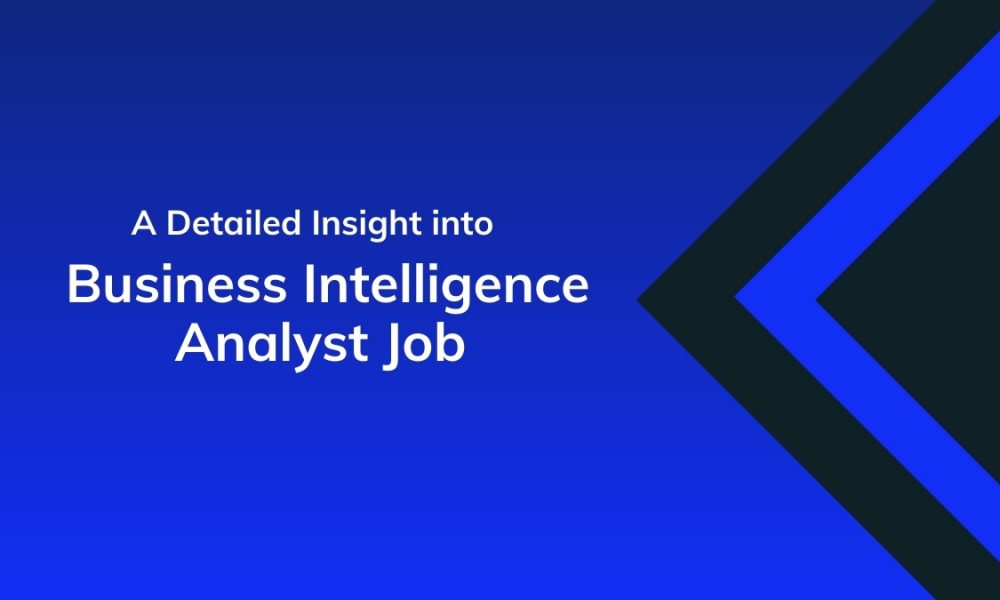Business Intelligence (BI) has rapidly become a very important area for companies finding ways to enhance how they use the data they collect. The reason why Business Intelligence (BI) has progressed by leaps and bounds is because it enables the companies to use the data that they hold proficiently by examining it and then making the most of it to inform business decisions.
What is Business Intelligence (BI)
You probably would have heard of the term Business Intelligence, but may be uncertain what it actually means. Business Intelligence refers to the insights obtained from examining the business information that companies hold.
Businesses have huge quantities of data, all of which can potentially offer them with thorough insights to inform crucial business decisions. This data needs to be mined and examined in the proper way to comprehend its full potential and to offer valuable insights for the business.
What is a Business Intelligence Analyst?
Business intelligence analysts are essential part of making the huge amount of data now accessible to companies useful. Business intelligence analysts can truly straddle the worlds of business and IT, having a solid grasp of each, and are capable to mine and examining data to suggest growth strategies for a company.
Once a business intelligence analyst comes up with recommendations for technological advances in a company, they are frequently needed to lead seminars for contemporaries, including training managers to put into practice and check these new systems.
Business Intelligence Analyst Job Requirements
The following are some the requirements that somehow needs to be fulfilled to become a Business Intelligence Analyst.
- A Business Intelligence Analyst needs to have a college degree in Computer Science, IT, Finance or any similar area.
- A typical Business Intelligence Analyst needs to have knowledge in technology such as C#, VSTO, Power BI, SharePoint, SAS, MEAN Stack that can have huge influence on his job.
- A Business Intelligence Analyst must have grip over SQL Server skills including SQL objects development, performance tuning, data analysis as well as integration.
- He must have knowledge in investment Analytic tools such as FactSet, Bloomberg etc.
- A typical Business Intelligence needs to have skill to read code and support applications, reports and processes.
- He must have exceptional analytical and problem solving skills
- A Business Intelligence needs to have ability to contribute both independently and also as part of a team
- It is also necessary that a Business Intelligence must have excellent listening, communication, interpersonal as well as presentation skills.
Technical skills needed to be a Business Intelligence Analyst
The following skills are a must to become a successful business Intelligence Analyst:
- Database design and data architecture
- Data mining and analytics
- Comprehend which situations need Hadoop, R, and SAS and use these effectively
- Data security and privacy
- Data visualization, including tools such as Tableau and Qlik
- Handle all variants of SQL
- Proficient in ETL (extract, transform, load)
- Cloud computing and data storage technology, such as BigQuery and Redshift
Responsibilities of a Business Intelligence Analyst
Some of the essential roles and responsibilities of a Business Intelligence Analyst include:
- To write data collection and processing procedures.
- To make sure that data is being properly gathered, stored, and analyzed.
- Reporting data findings to the higher management.
- Repeatedly monitor data collection.
- Develop methodologies to get better data analysis.
Benefits of Business Intelligence Analysts
Business Intelligence Analysts have rapidly become extremely valuable to companies as the amount of data that they gather continues to grow.
Moreover, the demand for Business Intelligence Analysts has predicted to rise in the future to keep up with the needs of companies and the data that they have.
The skills of Business Intelligence Analysts are in extremely high demand. As companies persist to collect more data, this demand is set to boost even further.
If you are someone who is interested in developing a career that is vital to business decision making and plays a crucial role in the future achievement of a company, working as a Business Intelligence Analyst could be an ideal choice.
Business Intelligence Analyst Salary
As per Payscale.com, the average salary of business intelligence analysts is $66,000. It is also worth mentioning that skills in data warehousing, data modeling, and data mining are linked with higher-than-average pay.
As far as the best-paid business intelligence analysts are concerned, they are in San Francisco and Washington, Seattle, D.C. Houston, and Boston all offer several well-paid positions as business intelligence analysts as well.
It is also worth mentioning that Business intelligence analysts can often move into higher-level jobs within 10 years with various roles such as analytics manager, business intelligence architect, business intelligence manager, and analytics manager.
Best Business Intelligence Certification
As far as certifications are concerned, the Certified Business Intelligence Professional (CBIP) offered by Transforming Data with Intelligence (TDWI) is currently one of the best professional certification available being specifically tailored to BI analysts.
The best part is that you can be certified as a practitioner, which is the designation awarded if you score above 50% on all three exams. This level reveals working information of associated Business Intelligence concepts, methods and tools.
The best professional certification for BI analysts is Microsoft’s Certified Solutions Expert in business intelligence. This certification shows that you have the essential skills essential to design and use SQL to bring data-based solutions. The exam includes inquiry and administering SQL databases, applying a data warehouse and data models, and scheming business solutions.
You can also decide to get certified in specific BI tools such as Hadoop, Python, R, SAS, and other programming languages or software designed for data analysis and data visualization.
If you monitor a specific tool or framework is included on the job descriptions you’re involved in, it might be worth getting certified to make your chances better.

Leave a Reply